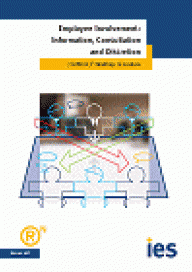Publications
 We author and publish a range of resources to keep you up to date with the latest developments in employment, labour market and human resource policy and practice.
We author and publish a range of resources to keep you up to date with the latest developments in employment, labour market and human resource policy and practice.
All our pdf publications are free to access.
-
📄
Mapping the Wider Care Workforce
Jagger N | Feb 2006 | Institute for Employment StudiesThis expert paper explores the nature and dynamics of the wider care workforce. In doing so, it considers the expected expanded contribution by the voluntary sector, community organisations and charities, and social enterprises, alongside users and their carers. It goes on to explore issues of gender, age, ethnicity, qualifications and other background descriptors of the wider care workforce.
-

Employers' Use of Migrant Labour
Main report
Dench S, Hurstfield J, Hill D, Akroyd K | Feb 2006 | Home OfficeThis publication is no longer available from the client. The Home Office commissioned IES to conduct research into the recruitment and employment of migrant workers in the UK. This research formed part of the preparation for change from the current economic migration system to the new points-based system. The focus of the study was on economic migrants: people who come to this country primarily to work, rather than asylum seekers or refugees. Data were collected between April and August 2005.
-

Student Income and Expenditure Survey 2004/05
Finch S, Jones A, Parfrement J, Cebulla A (NatCen), Connor H, Hillage J, Pollard E, Tyers C, Hunt W, Loukas G (IES) | Feb 2006 | Department for Education and SkillsThe 2004/05 Student Income and Expenditure Survey, commissioned by the Department for Education and Skills and the National Assembly of Wales, covered a random sample of just over 3,700 full-time and part-time students in higher education, in England and Wales, at 88 institutions. It was the first comprehensive assessment since 1998/99 and was designed to set a baseline against which future changes, following the 2004 Higher Education Act, could be monitored.
-
📄
Business Models and HR
Logic or Fashion?
Robinson D, Wolfe H | Jan 2006 | Institute for Employment StudiesThis paper explores the extent to which there is a link between business models and HR, in terms of structure, function and skills.
-
📄
The Application of an Inexact Science
Job Evaluation in the 21st Century
Suff P, Reilly P | Jan 2006 | Institute for Employment StudiesThis paper discusses uses of job evaluation (JE) and the different types that exist, and advises on how to select a JE scheme. It looks at JE in today's workplace, and shifting expectations. Pay flexibility and equal pay protection are also discussed.
-
📄
Women in London's Economy: Qualitative Research
Hurstfield J, Miller L, Page R, Willison R, Loukas G | Dec 2005 | Institute for Employment StudiesThis qualitative research examines: influences on women's employment choices, perceptions and experiences; attitudes to training and employment of women in sectors identified as areas of growth by GLA Economics (financial services; legal services; ICT; creative and media; and administration); work and employment practices that form barriers to equality in these sectors; and other specific policies and practice, including best practice.
-

Women in London's Economy
GLA | Dec 2005 | Greater London AuthorityThis research for the Greater London Authority (GLA) showed that by 2016, it was expected that women would fill seven out of ten new jobs in London, with an extra half a million jobs in the capital. The main key sectors for growth in women's employment during the decade were predicted to be in business service and also health, education, and retail. The GLA commissioned IES to carry out and report on the qualitative research detailed in this report.
-
📄
Vocational Education and Training in the UK
Page R, Hillage J | Dec 2005 | Wissenschaftszentrum Berlin fur SocialforschungThe WZB Social Science Research Centre in Berlin commissioned a series of discussion papers from a number of researchers throughout Europe to examine employer-sponsored training in their own countries, in order to aid interpretation, comparison and analysis of the Continuing Vocational Training Survey and to help understand the causes of differences in the data. This paper examines employer-sponsored training for adults in the UK.
-

Employee Involvement
Information, Consultation and Discretion
Gifford J, Neathey F, Loukas G | Nov 2005 | Institute for Employment StudiesThis report presents five in-depth case studies of organisations with established and progressive employee involvement practices, and relates them to existing literature on the subject.
-
📄
An Evaluation of Adult Learners' Week 2005
Page R, Pollard E | Nov 2005 | National Institute for Adult and Continuing EducationIn May 2005, NIACE commissioned IES to conduct an independent evaluation of Adult Learners' Week 2005. The evaluation built on the previous year's evaluation, and specifically aimed to review and evaluate the reach and depth of ALW; identify and evaluate the nature and spread of events; review the scale and nature of media coverage; explore understanding of the aims and objectives of ALW; identify and evaluate the general impact of the Week and perceptions of its value for money. This publication is no longer available.
